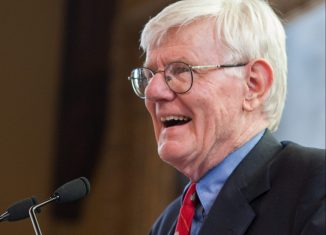Gordon Wood, decorated American Revolution historian, is optimistic for the nation’s future

This week marks the 247th anniversary of the signing of the Declaration of Independence.
In the nearly two-and-a-half centuries since this formative moment in American history, much has changed, with an uncertainty of the country’s long-term future.
Gordon Wood, professor emeritus of history at Brown University and 1993 Pulitzer Prize recipient for his book, “The Radicalism of the American Revolution,” remains optimistic that America’s future is bright.
In an exclusive phone interview, he detailed why the American Revolution is relevant today, dismissing apocalyptic predictions.
Revolutionary relevance
Wood contends that despite prolonged separation from the American Revolution, this cause remains highly relevant today.
“It is the most important event in our history, bar none,” he said. “It not only legally created the United States, but it infused into our culture everything we believe.”
Wood maintains that America is “not a nation in the usual sense of the term.” By this, he means Americans are not bound by any common ancestry. Instead, the United States represents a particular set of ideas to which Americans subscribe.
“Someone once said that to be an American is not to be somebody but to believe in something,” Wood noted. “And what do we believe in? We believe in those things that came out of the Revolution: equality, liberty and so on.”
“There’s no other adhesive to hold us together, so I think we need to emphasize that,” he said.
American stability
Within contemporary national discourse, some have expressed fears that America is a declining democracy. Even the nonprofit think tank Freedom House, which measures the strength of democracy in countries around the world, has scored the United States incrementally lower in recent years.
Wood characterized some recent historical developments as “destabilizing,” though he maintained these concerns are often overblown.
“We’re still the greatest power the world has ever known,” the Brown professor emeritus said. “I think that we’re very stable, and I certainly think we’re at the height of our powers.”
Assessing the current geopolitical landscape, Wood acknowledged China is a rising global power. However, he maintained that America’s long-term outlook remains promising.
“I don’t see any evidence that China is going to replace us,” he said. “I think it would be unfortunate if we got into a war with China over this fear of being displaced, but it’s just not in the cards.”
He added that fears of American decline have been pervasive throughout the nation’s history, with concerns about China just the latest iteration of this long historical pattern.
“We have a lot of apocalyptic thinking that goes on, and that’s not new,” Wood said. “We’ve always done that. There are always people saying that we’re going to fall apart.”
Triumph of the future
Wood suggested Americans have an unusual relationship with their national history. “I don’t think we have ever been a historically minded people compared to other nations,” he said. “I think it was President James Polk [1845-49] who said the United States is the only country in the world that has its history in the future.”
Since the Revolution, Americans have always been a “future-oriented people,” according to Wood. Yet the ideas articulated by the Founding Fathers have been passed down to subsequent generations of Americans, and those values are still practiced today.
Americans “know about ‘life, liberty and the pursuit of happiness,’ and ‘all men are created equal,’” Wood said. “Those are phrases that are very potent and available to most people, but I don’t think there’s much real interest in history as such among Americans.”
But, he added, “I’m not sure that that’s a bad thing. We’re future-oriented. We think the future is going to be better than the present.”
Wood concluded by saying that America’s faith in the future has long attracted new immigrants. Despite the numerous complications throughout its history, America still draws in people from all around the world.
Wood indicated that this attraction demonstrates how the American Dream lives to this day.
“Immigrants still want to come here because they can get a better life here than they can where they came from,” he said. “It’s an optimistic view.”






